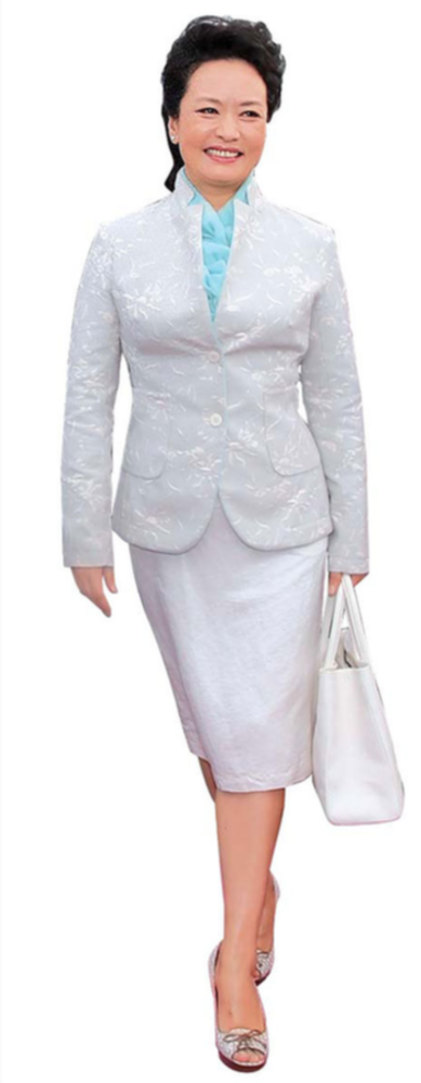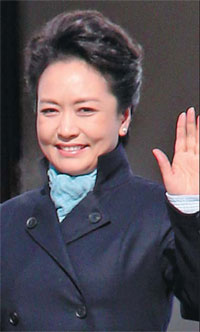Looking in the first lady's mirror
Updated: 2013-04-12 08:27
By Chen Jie (China Daily)
|
|||||||||||

|
Left: Peng Liyuan wearing a navy blue coat designed by Ma Ke; Above:Peng wearing white silk suit. Photos by Xinhua and Reuters |
When Peng Liyuan stepped off the plane in Moscow, the whole world wanted to know who dressed the elegant first lady of China
Peng Liyuan has been wearing Ma Ke's designs for more than a decade, a fact that was only highlighted recently when the first lady accompanied her husband President Xi Jinping on his first state visit to Russia and three African countries. The elegant and glamorous Peng, formerly a popular singer, has been compared to the US' first lady Michelle Obama and France's Carla Bruni-Sarkozy, since stepping off the airplane in Moscow on March 22. Suddenly, everyone was curious to know more about the first lady's wardrobe.
Even so, Ma, who did not want her photo to be used, has been reluctant to raise the veil, as she prefers a low-key approach. "If you eat a tasty egg why would you want to see the hen?" she says of all the media attention.
Ma's relationship with Peng began 10 years ago after a concert in Guangzhou when a reporter told Peng she knew the designer behind the label Exception de Mixmind, which was based in the provincial city. Peng asked for an introduction because she was a fan of Ma's designs and had been wearing them for years.
The two naturally became friends.
"I never choose a customer, the clothes do this," Ma says.
"The painting reflects the painter, and the writing mirrors the writer. Clothes reflect both the designer and the wearer. Desire for fame and wealth, or love and compassion; what you have in your heart is reflected in the design.
"If someone does not share my philosophy they will not buy my clothes. Professor Peng is a caring person, dedicated to charity and environmental protection, which is exactly what I'm doing now."
Ma calls the first lady "professor" as Peng was the first Chinese soprano to earn a master's degree, and was a visiting professor at China Conservatory of Music and the Music Institute of Shanghai Normal University.
It was three months ago that Ma received an order from the first lady to design her wardrobe for her debut state visit.
"I did not feel surprise or any pressure. We've been friends for many years and I know she loves and understands my designs," says Ma.
Even so, this was the first time she had custom-designed clothes for an individual in her 21-year career.
"I did not feel pressure because I did not think about how to present a first lady. For me, it is more worthwhile to explore how to present a sophisticated, wise and contemporary Chinese woman who is independent minded, tender and heartfelt," she adds.
Naturally, Ma has been compared to Jason Wu, who became famous overnight after Michelle Obama wore his dresses. But Ma insists little has changed for her since Peng stepped into the international spotlight wearing her clothes.
"Professor Peng is very easy-going, kind and open-minded. She respects my work and never interferes with my designs," she says.
The designer admits she has received hundreds of calls from friends and media but prefers to maintain a quiet life and has only granted a few e-mail interview requests, including to China Daily.
"So, my life has not changed. I have always believed fame and wealth are illusions, I just want to be a normal person," she says.
"Even so, I should thank professor Peng as she has become a great role model for Chinese people to buy domestic products and support the change from 'made in China' to 'created by China'.
"I hope her all-Chinese dresses and accessories will raise people's awareness of the strengths of Chinese tradition, heritage and eco-fashion, and make people confident of building a beautiful, green China."
In 1988, the then 17-year-old Ma left her hometown in Changchun, Jilin province, to study design at Suzhou Silk Institute (now merged with Suzhou University) in Jiangsu province. She chose a career in fashion design because she loved painting and the clothes handmade by her mother.
"I think clothes are the things closest to a person. At any time, anywhere, people need clothes and they can express emotion. There never used to be a fashion industry. Mothers made clothes for the family, it was a kind of bond. That's why we have the poem: 'The threads in a caring mother's hands are turned into the clothes for the son who leaves home,"' she says.
"Now design is my profession and it is the way I share love with people."
After graduating in 1992, Ma met designer Mao Jihong, and they shared a dream of launching their own brand in Guangzhou. The couple later married and divorced.
To begin with they worked for a small fashion company, after which they spent their entire savings of 300,000 yuan ($48,400) to found Exception, in 1996 - which was China's first independent designer label.
Mao took care of marketing and branding while Ma focused on design. They developed Exception into one of the major Chinese labels and secured a number of loyal high-end clients such as Peng, who appreciated the brand's aesthetic of unique and high-quality dresses.
This commercial success did not make Ma arrogant; rather she turned to nature.
She was tired of creating trendy collections every season and describes the process as being an actor creating an illusion.
"I prefer to make clothes for real life," she says.
Following her heart, Ma began her new life in 2006. She left Guangzhou, retaining the title of artistic consultant at Exception, and established the new label, Wu Yong (which means "useless"), a charity and eco-fashion workshop promoting heritage craftsmanship in Zhuhai, Guangdong province.
Explaining the brand name she says her label turns what some people term "useless" into fashion. "We live in a time of people overusing resources. We don't need so many clothes or furniture. It's not necessary to change our wardrobe every season," Ma says.
She found a private garden that used to belong to Tang Shaoyi (1862-1938), the first premier of the Republic of China, to base her workshop in. She then recruited some 20 craftsmen to spin silk, weave and dye the cloth, on machines used a century ago.
In a world where consuming fast fashion is the trend, a craftsman in Ma's workshop takes three months to make a quilt.
"It's my field and I want all the crops in it to grow slowly and naturally," she says. "I want to inspire people to live a simple life and have a free spirit."
She says that in Exception's first small office there were always a lot of fashion magazines, but in the Wu Yong workshop, there aren't any. She claims not to have gone shopping for seven years.
While Exception has boutiques in most cities, competing with international luxury labels, Wu Yong has just one workshop and only a few close friends like Peng are able to wear her clothes. Ma says before turning 35, she learned the language of design, but since then she has focused on expressing herself through Wu Yong.
In February 2007, she became the first Chinese designer to present a show at Paris Fashion Week. The Wu Yong show created a stir because the audience walked around the seated models dressed in earth-colored robes, rather than strutting around on the stage.
Since then she has appeared to be more like a contemporary artist, providing exhibitions of her work in Shenzhen, Venice and London.
Ma adds her first role model was Jane Goodall. At 8, she read all about her work with chimpanzees in Tanzania and wanted to devote herself to animal welfare issues, which likely explains the presence of eight dogs at her Wu Yong workshop.
"Living with animals makes me aware of the importance of the balance between nature and humanity. It's the basis of my creativity now," she says.
"Professor Peng shares the same values. She devotes herself to environmental protection and welfare issues. Our common goal is to raise people's awareness and to treasure the Earth and make the sky clear, water clean and life better."
chenjie@chinadaily.com.cn
(China Daily 04/12/2013 page24)
Today's Top News
List of approved GM food clarified
ID checks for express deliveries in Guangdong
Govt to expand elderly care
University asks freshmen to sign suicide disclaimer
Tibet gears up for new climbing season
Media asked to promote Sino-Indian ties
Shots fired at Washington Navy Yard
Minimum growth rate set at 7%
Hot Topics
Lunar probe , China growth forecasts, Emission rules get tougher, China seen through 'colored lens', International board,
Editor's Picks

|

|

|

|

|

|






